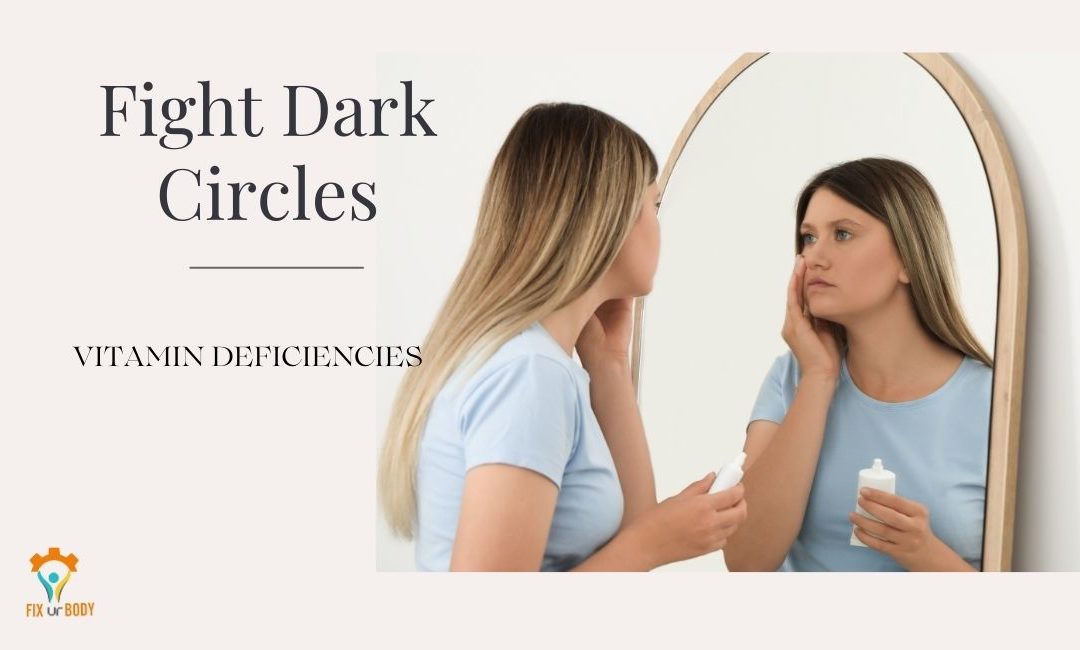Do you want to know more about dark circles under eyes causes vitamin deficiencies related issues? Have you been battling dark circles under your eyes without knowing why they persist? Amidst the hustle and bustle of daily life, it’s easy to overlook the importance of a balanced diet and self-care, only to find these neglects mirrored on your face – often in less-than-ideal ways.
But what about those times when dark circles linger despite ample rest and relaxation? You’ve landed on the right page if you’re seeking answers about the deficiencies that cause dark eye circles. Let’s delve into this issue and address some burning questions surrounding it.
Table of Contents
Are Dark Circles Under Eyes a Sign of Illness?

Primarily, dark eye circles pose more of an aesthetic concern than a medical one. However, certain conditions, such as seasonal allergies, inflammatory skin reactions to skincare products, or age-related changes, can accentuate the appearance of periorbital veins (blood vessels) under the eyes. The loss of fatty tissue around the eyes as we age can also contribute to a hollowed look, casting shadows that mimic the appearance of dark circles.
Many factors are at play here, ranging from deficiencies to poor blood circulation. We’ll explore them in detail to provide you with a comprehensive understanding of the matter and equip you with the knowledge to address it effectively. Fortunately, many treatments for dark eye circles exist, spanning from medical interventions to home remedies tailored to the cause and type of dark circles.
What Are Dark Circles Under Eyes Causes Vitamin Deficiencies?
Vitamins, particularly those of vitamins E, D, K, A, and B12, alongside iron, are associated with dark circles under eyes causes vitamin deficiencies. Let’s shed light on this issue.
Iron deficiency, accompanied by certain symptoms, can contribute to the appearance of dark circles. Insufficient iron levels impede the production of hemoglobin, which is responsible for oxygen transport across tissues. This deficiency typically manifests as anemia, often with symptoms like dizziness, fatigue, pale skin, and irregular heartbeat. Notably, pale skin, particularly noticeable around the delicate eye area, underscores the prominence of blood vessels, accentuating any changes in their color.
Root causes of iron deficiency anemia vary, ranging from dietary imbalances and inadequate iron intake to conditions like celiac disease or internal bleeding. Diagnosis involves comprehensive blood tests, including hemoglobin and ferritin levels, to gauge the severity of anemia. Treatment typically involves dietary adjustments, with iron-rich foods like eggs, red meat, beans, and leafy greens. Iron supplements, albeit under professional guidance, may also be prescribed with periodic monitoring to assess treatment efficacy.
Foods That Cause Dark Circles Under Eyes
Dark circles under the eyes can also be caused by dehydration, and certain dietary habits. Foods high in salt, such as processed snacks, canned soups, and fast food, can contribute to water retention and puffiness around the eyes, exacerbating the appearance of dark circles. Additionally, consuming excessive amounts of caffeine and alcohol can lead to dehydration, which may make dark circles more prominent.
Foods that individuals may be allergic to, such as dairy or gluten, can also trigger inflammation and result in dark circles. Common allergenic foods like nuts, shellfish, eggs, and soy can also contribute to the development of dark circles under the eyes in susceptible individuals. These foods can cause allergic reactions that manifest as inflammation and swelling, leading to the appearance of dark circles. Maintaining a balanced diet rich in fruits, vegetables, lean proteins, and hydrating fluids can help reduce the likelihood of developing dark circles under the eyes.
Does Vitamin D Help Reduce Dark Circles Under Eyes?
While direct evidence linking vitamin D to dark circles is scarce, deficiencies in this nutrient, particularly prevalent in females aged 40+, can exacerbate issues like puffy eyes and dark circles, adding years to one’s perceived age. Given its crucial role in various bodily processes, vitamin D deficiency warrants attention, especially in regions with limited sun exposure. Supplementing vitamin D-rich foods like red meat, fish, egg yolks, and fortified cereals can help address deficiencies.
Vitamin K Deficiency
Vitamin K, encompassing K1 and K2 variants, plays essential roles in blood coagulation and calcium regulation. Foods rich in vitamin K, such as tomatoes, cauliflower, and turnip greens, can support eye health. Additionally, topical creams containing vitamin K can aid in strengthening blood vessels around the eyes, complementing dietary intake.

Vitamin B12 Deficiency and Dark Under Eye Circles
Vitamin B12, integral to red blood cell production and metabolism, interacts closely with iron levels. Its deficiency may disrupt sleep patterns, exacerbating dark circles and skin dullness. Foods rich in B12 include meat, liver, dairy products, and leafy greens, offering a holistic approach to addressing deficiencies.
What Vitamin is Good for Dark Circles Under Eyes?
Vitamins E and A stand out as beneficial for combating dark circles. Vitamin E, with its antioxidant properties, supports skin health and can be applied topically or ingested through supplements and foods like cheese, papaya, and sweet potato. Similarly, vitamin A, commonly found in retinoids, aids collagen production and skin regeneration, aiding in dark circle reduction.
Does Vitamin C Remove Dark Circles Under Eyes?
Vitamin C’s brightening properties can help address hyperpigmentation, evening out skin tone, and diminish dark spots. Topical creams and serums containing vitamin C, combined with dietary intake from sources like citrus fruits and leafy greens, offer a comprehensive approach to combating dark circles.

Final Thoughts on How to Reduce Dark Circles Under Eyes
While home remedies like retinoid creams and cold compresses may offer temporary relief, addressing underlying deficiencies and seeking professional guidance remain paramount for long-term solutions. Consulting a dermatologist or healthcare provider can help identify deficiencies and tailor treatment plans to your specific needs through dietary adjustments, supplementation, or medical interventions.
Remember, taking control of your dark circles starts with understanding their root causes and taking proactive steps toward addressing them. With the right approach and guidance, you can bid farewell those pesky shadows and embrace a brighter, rejuvenated under-eye area.


